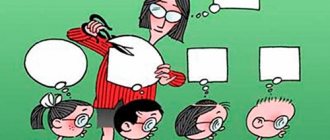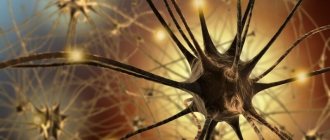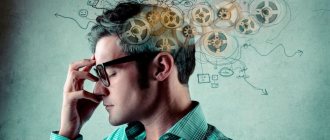Cognitive functions. What is this?
All cognitive functions are divided into memory, attention, speech, praxis (purposeful activity), gnosis (orientation, recognition of place and time), thinking. The capabilities of cognitive functions form the personality of an individual, determine success in education, professional activities, and other areas of life.
There are 4 main interacting components of cognitive functions : 1. perception of information (visual, auditory, tactile gnosis, smell, taste, etc.); 2. processing and analysis of information (“executive” functions), which include voluntary attention, generalization, identification of similarities and differences, formal logical operations, establishment of associative connections, drawing conclusions. This also includes thinking and intelligence, which imply, among other things, the ability to adapt in society, behave adequately in a changing environment, building a program of behavior, adjusting one’s actions based on the appropriateness of the moment; 3. memorization and storage of information (memory) and 4. exchange of information, construction and implementation of a program of action - “expressive” functions, which include speech, skills of targeted motor activity (praxis) Memory is the ability of the central nervous system to assimilate new information, store it and repeatedly use in the process of life. Memory consists of stages: memorization (retention), storage of information and reproduction of information. In vascular cognitive disorders, information reproduction suffers to a greater extent, while memorization and storage may be preserved. Semantically mediated “cues” during testing help patients reproduce information. In neurodegenerative diseases (AD), memory is primarily affected. There are individuals with hypo- or hypermnesia, with innate “mnestic giftedness”. There are patients who are sensitive to interference (distractions), and there is a primary weakness of memory even without interference. When the reproduction of information is impaired, pseudo-reminiscences (minor inaccuracies in details), contamination (inclusion of some memories in the structure of others), confabulations (events that do not take place are remembered) are distinguished. HYPOMNESIS is divided into: Fixation (the period of time corresponding to a certain event is forgotten), antero- and retrograde; progressive and non-progressive
M.S Vegetti
Rome, Italy
Modern research in various disciplines, such as psychology, neuropsychology, neuroscience, philosophy, clinical neurophysiology, is characterized by increasing interaction between scientists, as noted by A. Marcel & Eg. Bisiach (1988).
Analysis of these interactions may demonstrate that there is a growing tendency in clinical fields to raise theoretical questions and cognitive issues to build models of the functioning of normal and pathological mental and behavioral processes.
At the same time, there is a growing participation of philosophers of science and theoretical philosophers in the analysis of brain functions underlying cognitive processes, as can be demonstrated by the opening of a new training program in theories and methods of knowledge at the Faculty of Philosophy of the 1st University of Rome.
A similar picture is observed in research in general cognitive and educational psychology, which is the focus of this report. This view is based on modern research on learning and, more specifically, schooling, which shows that individual cognitive processes, such as attention or working memory, are insufficient to ensure success in school learning.
Some evidence from neuroscientific attention studies by Driver and Vuilleumier (2001) explains that even this single process can be viewed as the result of an interaction between the visual system and areas of the frontal and parietal cortices, thus again requiring a broader context to consider this process. and the problem persists.
In addressing the problem of consciousness, many scientists agree that brain science must avoid both reductionism and dualism.
We can recall that at the beginning of the formation of psychology as a science, the refusal to consider consciousness as a possible object of psychology did not bring fruitful results. There are classic research findings in psychology that are inexplicable without reference to a comprehensive definition of what it means to be aware and self-aware of the basic forms of personal experience (see, e.g., Bruner & Goodman, 1947).
The main question, then, is—as Patricia Churchland Smith (1988) put it—to try to clarify the explanandum. To do this, she lists different modes of awareness, starting from Dennett's (1988) definition of “things as they appear to us” (p. 42), to more subtle proprioceptive sensations, to other aspects of consciousness such as planning, thinking, decision-making, representation and prediction of tasks, as well as to various types of awareness of temporal extension, sequence, ordering or location in space, which are typical of the highest level of functioning and introduce an additional level of awareness of oneself as “I”, as something different from other objects. This brings us close to the topic of the specific functioning of the human subject.
Anyone who has become acquainted with the outstanding works of A.R. Luria on higher cortical functions and who has had the opportunity to debate with him about the cultural-historical approach to neuroscience will agree that one of his main contributions to neuroscience is the description and proposal of the concept of “romantic science” (Luria, 1982). The latter does not completely intersect with the cultural-historical concept of higher mental functions of L.S., Vygotsky (1934, 1984), due to different areas of application, but the methodology of these scientists offers a general strategy of scientific analysis, including the combination of natural and historical sciences.
Luria intended to make romantic science as an attempt to combine nomothetic and ideographic approaches in clinical research as close as possible to the theory of the Subject of consciousness (Dennett, 2001). Let's look at this in a little more detail.
The goal of a specific scientific analysis, according to Luria (1982), should be to consider a phenomenon in a system of all possible relationships. If this analysis is applied to higher mental functions of a person, the scientist must avoid observing and describing subjective experience as a discovery resulting from first-person introspective description Dennet (2001) also writes that there is no first-person science, but only heterophenomenology, as an approach to third-person consciousness (p. 230).
In Luria's proposal, the clinician observes and reports facts derived from the conscious transmission of his own experience by another subject, which constitutes a “non-invented portrait.” A portrait of a specific person with one trait that defines his entire personality, as was the case with a person with exceptional memory - Shereshevsky.
In this case, communication between an expert clinician and a patient suffering from a specific syndrome, conscious reference to one’s own experience, makes it possible to identify a path to a specific explanation of the genesis of self-consciousness through awareness of subjective pathological experience.
In fact, this experience is achieved without an abstractly learned or passively accepted diagnosis, that is, without the clinical intervention of “qualia”.
disadvantages – previous | next – reflective consciousness
A. R. Luria and psychology of the 21st century. Content
Cognitive processes in educational activities
Many learning theories recognize the importance of cognitive processes. During study, all cognitive processes are maximally involved. To get the desired result from studying, you have to put in effort and time.
Cognitive processes in learning to read
To read, a person needs to know letters and sounds, be focused, remember and understand the words he is reading. It is also important to relate what you read to your existing experience.
Depending on the task that the reader sets for himself, he can process information differently. For example, when he reads a novel to have a good time or studies from a textbook for an exam.
Cognitive processes in writing
When writing text, the same cognitive processes are involved as in the case of reading. A person writing needs to remain focused, ignore extraneous stimuli, and monitor the legibility of letters, spelling and punctuation.
Before you start writing, you need to draw up a plan for the text, think through the content so that readers understand it.
Ways to improve cognitive processes
Cognitive abilities can be developed at any age. Simple recommendations will help with this.
- Take care of your health. General well-being and the state of the nervous system are directly related to the quality of cognitive processes. Productivity decreases if a person leads an unhealthy lifestyle or suffers from lack of sleep. Pathologies of the cardiovascular, nervous system and other health problems can also lead to a decrease in mental abilities.
- Use brain trainers. Special computer programs, logical tasks, puzzles - all this develops cognitive abilities. On the Internet you can find simulators with interesting tasks designed to develop attention, memory, perception, and speech in children and adults.
- Focus on successes. This is necessary to strengthen self-esteem and notice progress towards your goal. Even if you notice your own weaknesses and mistakes, it is important to believe in your own strengths and continue to improve yourself.
- Think critically. The habit of questioning information and seeking confirmation from authoritative sources helps you become independent and increase your level of competence. Critical thinking helps to think deeply, determine the relationship between events and facts, and analyze them.
- Read a lot. Reading activates many cognitive processes, gives pleasure, and serves as a source of new knowledge. Reading is an easy and enjoyable way to develop concentration, memory, language and imagination.
- Get creative. Write stories, draw, sculpt, dance and sing. Whatever creative activity you do, it develops cognitive abilities. Creativity improves concentration, the ability to find solutions in unusual situations, relaxation, broadens one's horizons and develops intelligence.
- Concentrate on one thing at a time. Try to avoid multitasking. The desire to do several things at once reduces productivity, creates a greater load on the brain, and leads to rapid fatigue. Multitasking does not imply concentration on one task; because of this, the quality of the actions performed suffers.
Cognitive processes are involved in the reflection and transformation of information from the external environment, forming experience and their own picture of the world. At any age, you can develop and improve cognitive processes.
Irina Sherbul
Cognitions
Cognition (from Latin cognitio) is “a generic term used to designate all processes involved in the acquisition of knowledge,” states Ernest R. Hilgard in Consciousness in Modern Psychology. This term covers all mental activities or states associated with the acquisition of knowledge and the functioning of the mind.
Cognition is a general concept that covers all forms of knowledge, including perceptual images, logical evidence and value judgments; the process of a person’s cognition of the world and himself, through which information is processed. It includes the level of sensations, the level of perception, attention, memory, the level of ideas and the level of thoughts. It is based on the client's beliefs, attitudes, expectations, ideas, perceptions, opinions and way of thinking.
In cognitive psychotherapy, the following cognitive structures and processes are distinguished: beliefs, attitudes, rules, expectations, attitudes, assumptions, automatic thoughts, schemas, systems of action and control. The content of the cognitive sphere is constantly changing. Cognitive changes occur at three levels:
- in voluntary thinking (thoughts can be caused at will, and they are temporary);
- in automatic thinking (thoughts arise involuntarily, they are temporary);
- in assumptions (beliefs).
These levels differ from each other in stability and accessibility for analysis.
What sciences study cognitive processes
Several sciences study cognitive processes:
- psychology (general, developmental, neuropsychology);
- psycholinguistics;
- neurology;
- anthropology.
Scientists began to show a particularly active interest in the study of cognitive processes in the 60s of the last century. The study of cognitive processes continues to this day. The acquired knowledge about cognitive processes is used not only by psychologists, but also by teachers, sociologists, and marketers.
Unusual experiment
With the gradual decline of the dominance of behaviorist concepts in 1971, psychologist Philip Zimbardo of Stanford University decided to take a bold step. Purpose of the study: to study the behavioral characteristics of a person in cruel conditions (limited freedom of action and will, pressure on moral principles). The recruitment of volunteers took about a month; not everyone was ready to calmly go to torture and obey any instructions. A total of twenty-four people were selected. In order to maintain the purity of the experiment, the candidates were divided into two groups. The first half included guards, and the other half included so-called prisoners. A laboratory assistant and an assistant psychologist acted as the main guards; Zimbardo himself became the manager of this research prison.
The subjects were "arrested" in their homes under false pretenses and under the direction of the Palo Alto police. The prisoners were transported to a fenced area, processed, assigned a number and placed in compartments. From the first minutes, the scientist began to record the mental reactions of the experiment participants and observe their behavior.
The experiment was originally designed to last two weeks, but ended after just six days due to the fact that things quickly got out of control. The “prisoners” were mocked, humiliated and even used physical violence. The “guards” quickly got used to the role and began to show sadistic tendencies, depriving the prisoners of sleep, forcing them to hold their hands up for a long time, etc. Many “prisoners” already experienced severe emotional distress and a feeling of depression on the third day of the experiment.
A significant result of the experiment can be considered the book by F. Zimbardo entitled “The Lucifer Effect” (2007), in which he described the effect of cognitive dissonance (conflict of emotional reactions in a person’s mind) and human obedience to obvious personal authority
Particular attention was paid to the influence of public opinion and the degree of government support, which can justify or reject the views of an individual
This was the most striking experiment in the field of cognitive psychology. For ethical reasons, no one else made similar attempts to repeat the experiment.
Varieties
Now let's figure out what mental processes are.
Basic (lower) cognitive processes
They are presented:
Feeling and perception
We are constantly exposed to various stimuli and signals that make us feel something. Feelings serve as an additional tool for understanding the surrounding reality. Moreover, they can come both from outside and from the depths of ourselves.
Gestalt psychologists, who are engaged in a detailed study of human perception of the world, made a great contribution here. They came up with the laws of Gestalt, which explain the perception of what is happening through optical illusions.
Attention
We live in a world of information and receive many signals and stimuli every day, while paying attention to what we are most interested in.
For a number of activities, such as walking or chewing, we do not need attention. But we will need greater concentration on what we say and how we present it, if, for example, we have to speak in public.
The positive thing is that when certain processes are repeated systematically, they become automatic. For example, if at first it’s difficult for us to drive a car, then later the skills are improved and performed “automatically,” thanks to which much less energy is wasted.
By memory
Our memory stores answers to countless questions that arise in life. It is thanks to it that we encrypt information received from outside and store it so that it can be restored when necessary.
Memory can be of different types: sensory, short-term, working, autobiographical, and so on. All of the varieties interact with each other, but they all originate in different parts of the brain.
Higher (complex cognitive processes)
They are presented:
Mind (intellect)
Intelligence is a set of abilities that help in solving various problems. Nowadays, the most popular theory is about multiple intelligences, which was proposed by Gardner. According to it, there is no one type of mind, and in different situations a person uses different abilities, starting from what is happening.
Smart people have a number of specific identifying characteristics. But intelligence can be improved; there are several methods for this.
Thinking
Human thoughts are incredibly complex and diverse. Thanks to thinking, we can solve various difficulties, reason, make decisions, think creatively, logically, and so on.
To simplify these processes, thoughts with judgments are created in our brain. Our task is to group ideas, objects, people, etc., which has an accelerating effect on mental processes.
But in the desire to achieve logic, a person often forgets about his irrationality. Just think - to speed up thinking we use shortcuts, but in the end we don’t analyze all the information! As a result, cognitive biases and deviations from the norm arise.
Due to cognitive biases, cognitive distortions, negative and irrational thoughts develop, which cause a lot of suffering. For example, “nobody loves me”, “I will always be lonely” and so on.
Fortunately, a person has power over his own thoughts, but not everyone is aware of it and not everyone knows how to use it correctly.
Speech
The human brain reproduces and understands different words, sounds, and combines an innumerable number of letters with sentences to express our thoughts and emotions. Some people speak several languages at the same time (polyglots).
Speech develops and improves throughout life. Although we are all born with different communication skills, they can improve with practice. The latter is especially important for people with speech disorders, because they can also be, if not completely eliminated, then at least reduced.











